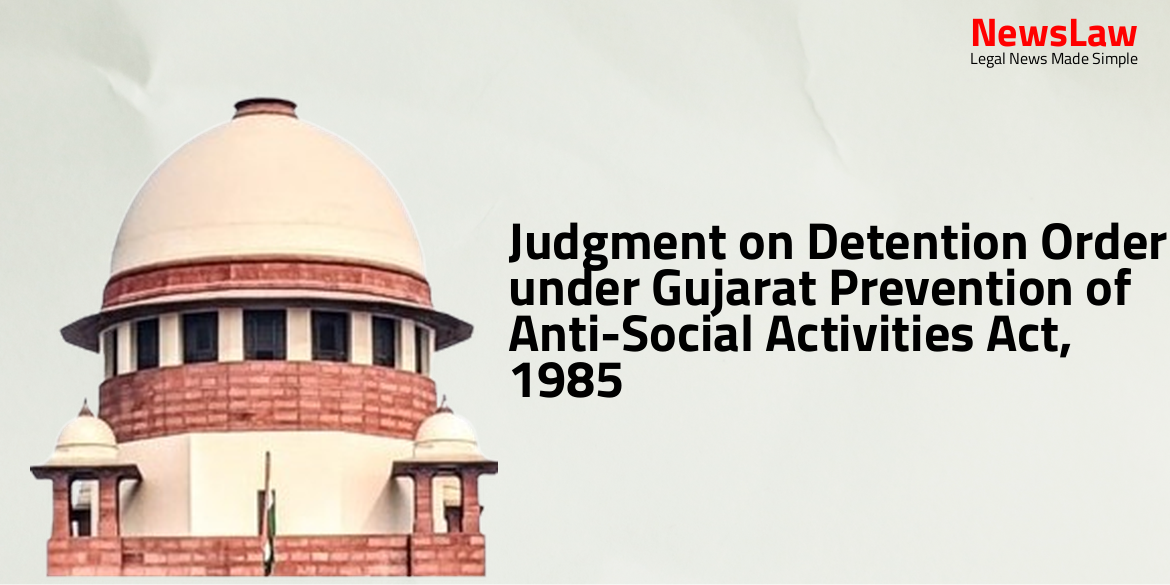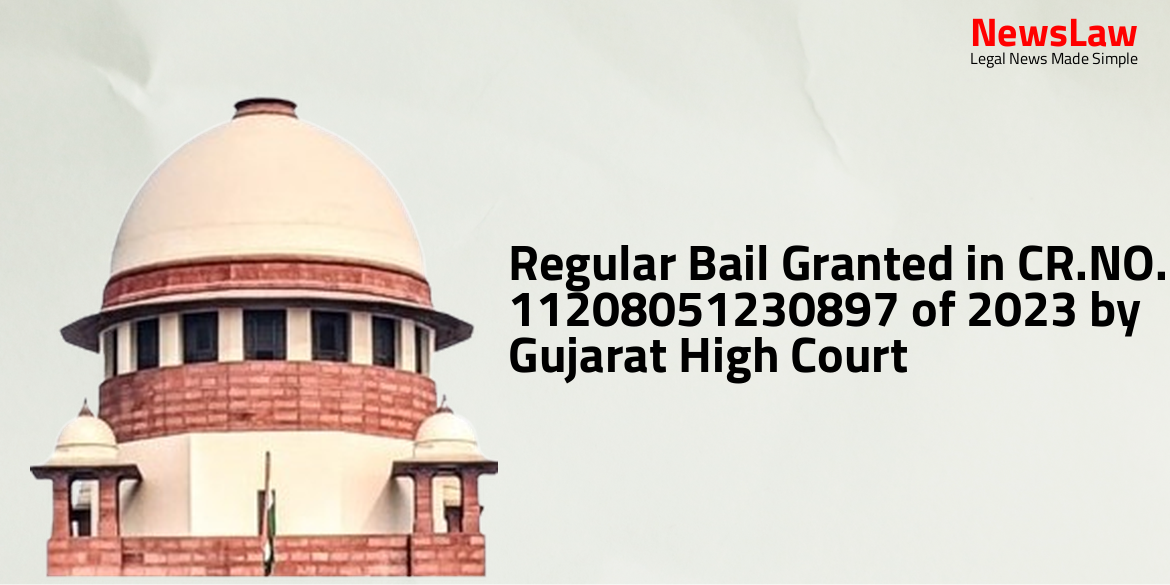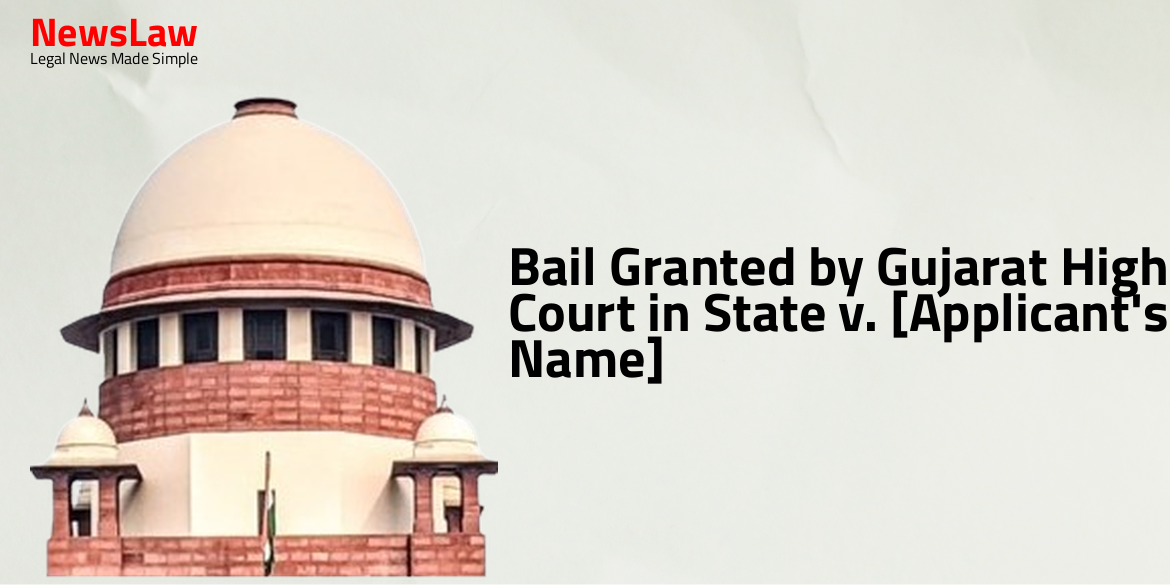In a significant ruling, the Gujarat High Court delivered its judgment on the detention order under the Gujarat Prevention of Anti-Social Activities Act, 1985. The case involved challenges to the detention of the petitioner under Section 3(1) of the Act, highlighting the constitutional safeguards and the importance of distinguishing between law and order and public order. The court’s decision sheds light on the exceptional powers of preventive detention and the necessity for detentions to align with constitutional values of personal liberty and public order.
Facts
- The present petition challenges the order of detention dated 25.1.2024 passed by the detaining authority under the Gujarat Prevention of Anti-Social Activities Act, 1985.
- The detaining authority justified the detention of the petitioner under Section 3(1) of the Act.
- The petitioner is considered a detenue under Section 2(c) of the Act.
- The petition is filed seeking relief against the detention order passed by the detaining authority.
Arguments
- The advocate for the petitioner – detenue argues that the order of detention should be quashed as it was solely based on the registration of three FIRs.
- The FIRs were for offences under Sections 379 and 114 of the Indian Penal Code, which according to the advocate, do not fall under the purview of the Act’s definition for detention.
- The advocate highlights that the alleged illegal activities do not have a nexus with public order but may constitute a breach of law and order.
- There is a lack of relevant material other than witness statements and FIR registration to prove that the detenue’s activities relate to breach of public order.
- It is argued that the detenue’s actions have not significantly disturbed the social fabric to pose a threat to public order or disrupt the system governed by the rule of law.
- The advocate points out that the detenue is out on bail for all the offences, which indicates a lack of immediate threat to public order.
- AGP for the State supported the detention order
- Materials and evidences found during investigation were supplied to the detenue
- Detaining authority’s subjective satisfaction found to be not legal or valid
- Offenses alleged in FIRs do not impact public order as required under the Act
- Other relevant penal laws are sufficient to address the situation
- Allegations against the detenue not relevant for Section 2(c) of the Act
- Detenue does not pose a threat to public order or society as per Section 2(c) of the Act
Analysis
- The case-law of the Apex Court has clarified the position of law related to the issue at hand.
- The colonial-era practices have been maintained with constitutional safeguards.
- There is no concrete evidence on record indicating the detenue’s behavior as a threat to public order.
- The order does not mention any application for bail cancellation by State authorities.
- A District Magistrate can act under Rule 30(1)(b) to prevent public order subversion, not for regular law and order maintenance.
- The powers of preventive detention are exceptional and even draconian.
- A mere disturbance of law and order leading to disorder is not necessarily sufficient for action under the Defence of India Act, but disturbances that subvert the public order are.
- Preventive detention involves detaining a person without trial in order to prevent them from committing certain types of offenses, but such detention should not be used as a substitute for ordinary law.
- The freedom of a human being is supreme and cannot be curtailed unless extremely necessary and the activities of the detainee affect public order.
- Authorities must ensure that any detention accords with the procedure established by law and the constitutional values of personal liberty.
- Every act of assault or injury to specific persons does not necessarily lead to public disorder, it must affect the community at large.
- The distinction between ‘law and order’ and ‘public order’ has been clearly laid down in various judgments.
- The misuse of preventive detention laws has been noted in several cases, leading to the quashing of detention orders.
- Detaining authorities must exercise caution and consider all relevant and cogent materials before invoking preventive detention laws.
- Proper appreciation of facts is required to determine if actions are prejudicial to the interest and security of the state or disturb public law and order.
- Offences alleged to have been committed by the Appellant are punishable under the Andhra Pradesh Prohibition Act
- The nature of the offences falls within the scope of the Act
Decision
- Rule made absolute
- Direct service permitted
Case Title: AEZAZ MEHBOOBBHAI MIYANA Vs. STATE OF GUJARAT
Case Number: R/SCA/3030/2024



